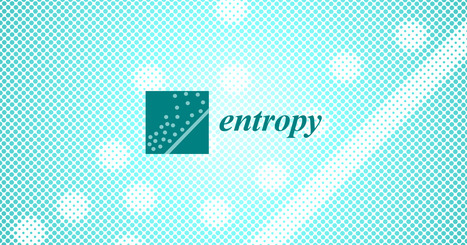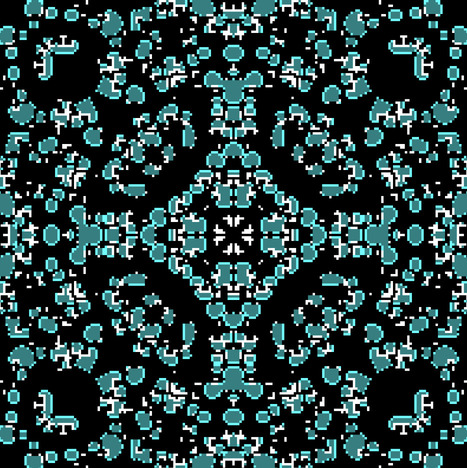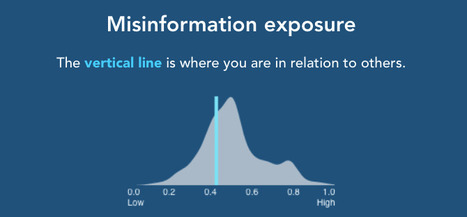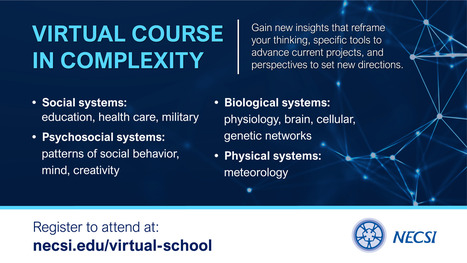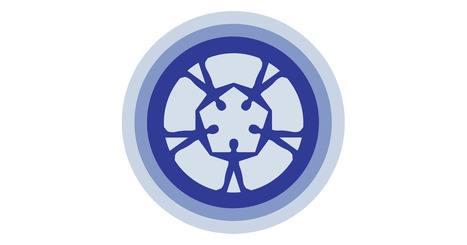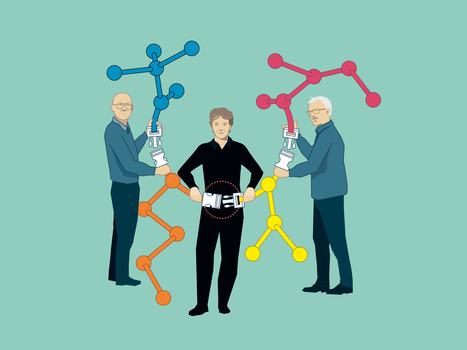 Your new post is loading...
 Your new post is loading...

|
Scooped by
Complexity Digest
September 21, 2023 7:28 PM
|
Dr. Sadamori Kojaku invites applicants for graduate research assistant starting in Spring 2024 in System Sciences and Industrial Engineering at Binghamton University. We are seeking highly motivated students to explore the following topics:
● Representation learning for text and graphs
● Complex Systems and Network Science
● Biases in AIs
● Computational social sciences and the science of science. More at: skojaku.github.io

|
Scooped by
Complexity Digest
August 25, 2023 11:13 AM
|
The Center for the Study of Complex Systems (CSCS) at the University of Michigan seeks applicants for a tenure-track faculty position in complex systems science. The Center is a broad, interdisciplinary unit whose faculty use and develop tools from applied mathematics, computation, physics, statistics, engineering, and network theory to understand questions in the social, biological, and physical sciences. This is a University-year appointment at the Assistant Professor level. The expected start date is August 26, 2024. More at: lsa.umich.edu

|
Scooped by
Complexity Digest
June 28, 2023 11:11 AM
|
The Informatics Institute of the University of Amsterdam is looking for an internationally visible and recognized researcher in Complex Adaptive Systems. The emphasis should be on novel computational methods to study the spatio-temporal evolution of emergent properties in a variety of interdisciplinary application domains.
The research will be driven by deep insights in (the theory of) Complex Adaptive Systems and novel computational methods to simulate the dynamics and emergent properties of such complex systems. Research that addresses computational challenges may include methods for simulating, calibrating, and validating large scale models of complex systems. The research will have a strong application pull, for instance in the realms of socio-economic systems or health and health care. Candidates that address interdisciplinary application domains and whose research contributes to the UN Sustainable Development Goals, will be preferred.
The informatics institute pursues research in five main themes: (1) Artificial Intelligence, (2) Computational Science, (3) Data Science, (4) People, Society, Technology, and (5) Systems and Security, embedded in 15 research groups. The professor will be positioned within the Computational Science Lab of the Institute for Informatics. The Computational Science Lab currently has two other full professors, one professor by special appointment, two associate professors, seven assistant professors, and one lecturer. It is expected that the candidate will proactively collaborate with colleagues in the lab and play a central role in mentoring junior staff, PhD candidates and postdocs. Details at: vacatures.uva.nl

|
Scooped by
Complexity Digest
June 14, 2023 1:26 PM
|
October 9 – 20, 2023 SFI Complexity Interactive (SFI-CI) combines the dynamic interactions of an in-person course with the flexibility to learn from anywhere in the world. This two-week, part-time, online course offers participants a theory- and applications-based overview of complexity science. Complexity Interactive provides a foundation for thinking broadly about complex systems, encouraging participants to explore syntheses across systems in an open dialog with SFI faculty. The program's size is limited to ensure everyone has ample opportunity to discuss with faculty and with each other. In 2023, the curriculum will investigate modeling humans and social behavior, focusing on methods and approaches from complex systems science. More at: www.santafe.edu

|
Scooped by
Complexity Digest
April 19, 2023 11:47 AM
|
In the two previous Special Issues, the discussion was mainly confined to conceptualizations within the domain of complexity theories. In the present Special Issue—“Information and Self-Organization III”— the aim is to further extend the discussion on information and self-organization to several new directions: Firstly, to questions of life (e.g., in line with Schrödinger’s What is Life?) and of artificial life. Secondly, to other conceptualizations such as Bohm’s implicate, explicate, and generative orders (including his notion of active information); and/or to Bohr’s complementarity principle and its implications to the domains of life, brain, coordination dynamics and society. Thirdly, as in the previous Special Issues, the aim is to explore the consequences of the above extensions on several research domains, ranging from physics and chemistry through the life sciences and cognitive science to our understanding of society and economy. However, in this Special Issue, there is a special reference to the dynamics of cities and urbanization. More at: www.mdpi.com

|
Scooped by
Complexity Digest
April 1, 2023 8:37 AM
|
The Complex Systems Society announces the ninth edition of the CSS Scientific Awards.
The Emerging Researcher Award recognizes promising researchers in Complex Systems within 3 years of the PhD defense.
The Junior Scientific Award is aimed at recognizing excellent scientific record of young researchers within 10 years of the PhD defense.
The Senior Scientific Award will recognize outstanding contributions of Complex Systems scholars at whatever stage of their careers.
Deadline: May 31st, 2023. More at: cssociety.org

|
Scooped by
Complexity Digest
February 22, 2023 4:42 PM
|
This explorable illustrates beautiful dynamical patterns that can be generated by a simple game theoretic model on a lattice. The core of the model is the Prisoner’s Dilemma, a legendary game analyzed in game theory. In the game, two players can choose to cooperate or defect. Depending on their choice, they receive a pre-specified payoffs. The payoffs are chosen such that it seems difficult to make the right strategy choice. Read the full article at: www.complexity-explorables.org

|
Scooped by
Complexity Digest
January 31, 2023 11:36 AM
|
FBK-CHuB is seeking a Researcher in the field of the classification, analysis and modelling of online disinformation spreading behaviour.
In particular, the candidate will be involved in a large European research project focused on the development of a platform tackling misinformation and disinformation across the EU by empowering scientific researchers and media practitioners with advanced AI-based technologies that: 1) allow multichannel (distinct online social media and news feeds), multilingual and multimodal (textual, visual and audio content) monitoring, detection and recording of misinformation and disinformation on online social media and traditional media; 2) estimate the risk of unreliable information consumption; 3) create a trustworthy online environment involving researchers, media practitioners and policy makers to facilitate the creation and distribution of reliable information and counter-narratives, while labelling and countering mis/disinformation. Read the full article at: jobs.fbk.eu

|
Scooped by
Complexity Digest
January 6, 2023 1:08 PM
|
In high-income countries, the COVID-19 pandemic fostered the generation of surveillance data at spatial and temporal resolution unseen before, providing comprehensive and accurate estimates of cases, detection capability, hospitalizations and deaths. At the same time, data describing behavioral response, mobility, mixing and compliance to public health measures have also become available with similar level of detail. Such an exhaustive picture of the unfurling of a pandemic was a first in human history, made possible because we live in the digital age. It does not imply that epidemiological surveillance will remain this way in the future. As COVID-19 becomes less virulent with vaccination and acquired immunity, political pressure is shifting away from comprehensive detection of cases, and individual willingness to get tested may also be declining. At the same time, corporate commitment to make proprietary data on human behavior available to scientific research (e.g., mobile phone data) is waning. This underpins the main scientific goal of this project: can we use the experience of "wartime" COVID-19 surveillance during years2020-2022 to improve epidemic understanding in the future "peacetime" period ? Typical data available for surveillance in peacetime is scarcer, for example syndromic surveillance for influenza and other respiratory viruses as reported in networks of general practitioners (GP), with limited virological confirmation. Other data sources, including participatory surveillance and drug sales, may complement such reports, but are less specific. Importantly, during the first 2 years of COVID-19, the aforementioned high-resolution data and the scarcer traditional data sources were observed together. We wish to exploit this overlap to build statistical and mathematical models that will extract more and better information from peacetime surveillance data. Specifically, we aim at generating estimates of incidence, severe cases, reproductive number that are better than those previously available in terms of spatial resolution, temporal resolution, predictive power (ability to make short-term forecasts and mid-term projections of epidemic activity). We will make use of AI/ML techniques to come up with models with which transfer of knowledge, for example from the dynamics of COVID-19 to that of Influenza, or from drug sales data to influenza, from mobility to infectious spread will make it possible to improve accurate estimation of influenza incidence and short term prediction. The impact of this project will be thus twofold. First, we will improve the knowledge and predictability of seasonal epidemic waves of airborne, directly transmitted pathogens. Second, we will provide with policymakers with new tools to inform public health response to seasonal acute respiratory illness. More at: soundai.sorbonne-universite.fr

|
Suggested by
mohsen mosleh
December 19, 2022 4:56 PM
|
How much misinformation you are exposed to? As part of our new paper in Nature Communications, we have build a web app and an API to measure misinformation from political elites on Twitter.
Give it a try! misinfoexpose.com
Find out how much misinformation you are exposed to.

|
Scooped by
Complexity Digest
October 10, 2022 2:07 PM
|
This year’s laureates in the Economic Sciences, Ben Bernanke, Douglas Diamond and Philip Dybvig, have significantly improved our understanding of the role of banks in the economy, particularly during financial crises. An important finding in their research is why avoiding bank collapses is vital. Read the full article at: www.nobelprize.org

|
Scooped by
Complexity Digest
October 5, 2022 11:30 AM
|
Alain Aspect, John Clauser and Anton Zeilinger have each conducted groundbreaking experiments using entangled quantum states, where two particles behave like a single unit even when they are separated. Their results have cleared the way for new technology based upon quantum information. Read the full article at: www.nobelprize.org

|
Scooped by
Complexity Digest
September 22, 2022 3:53 PM
|
Dates: October 18 - November 18, 2022 Registration Opens: September 19, 2022 More at: necsi.edu
|

|
Scooped by
Complexity Digest
September 19, 2023 9:41 AM
|
The Thomas J. Watson College of Engineering and Applied Science at Binghamton University invites applications for 2 open faculty positions at the Full or Associate professor levels, with a planned start date of Jan 2024 or Fall 2024. Outstanding candidates at the Assistant Professor level may also be considered. We invite prominent researchers in the interdisciplinary fields of artificial intelligence (AI), machine learning (ML), data science and their applications to complex societal problems. We seek, specifically, candidates who conduct and lead research in the design, development and implementation of advanced AI/ML and data theoretic approaches in socially relevant application domains including healthcare and public health, health disparities and equity, agriculture and food security, pandemic and natural disaster prevention and preparedness and energy and environment sustainability. Candidates should possess deep scientific and technical knowledge in the use of AI and Data Science to solve wicked problems and have proven experience in the application of these methodologies in one or more of the domains above. Ideal candidates will possess the fundamental expertise and the interest to apply and or translate their applied knowledge to different domains of critical importance. Expertise in AI ethics and policy are especially valued as is social systems intelligence and human centric AI. More at: binghamton.interviewexchange.com

|
Scooped by
Complexity Digest
July 25, 2023 1:46 PM
|
The Department of Systems Science and Industrial Engineering (SSIE) in the Thomas J. Watson College of Engineering and Applied Science at Binghamton University (The State University of New York at Binghamton) invites applications for two faculty members, at the tenure-track Assistant Professor level, starting in Fall 2023. The positions involve teaching at all levels from undergraduate courses to advanced graduate courses, and establishing theoretical and applied research in emerging areas in systems science. All positions immediately above are sought to start in Fall 2023 and require advanced expertise in their fields per the description below. Qualified applicants in other emerging areas of the systems science discipline may be considered. The Assistant Professor - Systems Science/Complex Systems/Network Science position will pursue newer topics such as Complex Systems, Network Science, Network Design, or other emerging topics in the broader discipline of Systems Science. Candidates with experience in the broad area of computational intelligence are preferred. The Assistant Professor - Computational Social Science/Biomedical Complexity/Epidemiology position is also highly computational. In particular, complex systems science has been particularly successful in building actionable models in social, organizational, and biomedical complexity, which leverage ML/AI/Statistical Inference but add explainability to the management of complex problems. It is expected that candidates applying for this role will pursue much broader applications including, but not limited to, Social Science/Networks, Organizational Science/Networks and Design, Biology, Medicine, and Mental/Public Health Modeling. More at: binghamton.interviewexchange.com

|
Scooped by
Complexity Digest
June 23, 2023 3:34 PM
|
PLOS Complex Systems will bring together all researchers working to understand complex systems. We will partner with the community to drive Open Science practices forward to enable rapid dissemination of groundbreaking results, cross-fertilization of knowledge, and increased collaboration to address the fundamental questions that affect individuals and global societies. More at: plos.org

|
Scooped by
Complexity Digest
June 5, 2023 4:36 PM
|
Gain new insights that reframe your thinking, specific tools to advance current projects, and perspectives to set new directions.
Dates: July 17-July 28, 2023 This summer, discover the science that teaches us about collected patterns of behavior, helps us understand the fluctuations of global finance, and can help us meet societal, organization and global challenges. This course provides an introduction to essential concepts of complex systems and related mathematical methods and simulation strategies with application to physical, biological and social systems. Concepts to be covered include: emergence, complexity, networks, self-organization, pattern formation, evolution, adaptation, fractals, chaos, cooperation, competition, attractors, interdependence, scaling, dynamic response, information and function. Methods to be covered include: statistical methods, cellular automata, agent-based modeling, pattern recognition, system representation and informatics. More at: necsi.edu

|
Scooped by
Complexity Digest
April 10, 2023 4:16 PM
|
A satellite session is usually a half-day session or full-day session. Longer satellites (one and a half or two days) will not be considered. Each satellite is organized and managed by its own committee, although the coffee-breaks and lunch will be offered by the CCS organization. The satellite organizers are responsible for reviewing proposed papers and working with their presenters. The deadline for satellite proposals is April 27, 2023.
Organizers of successful proposals will be notified by May 19, 2023 More at: ccs2023.org

|
Scooped by
Complexity Digest
March 7, 2023 4:09 PM
|
Employer: Rényi Institute of Mathematics
Place: Budapest, Hungary
Research theme: epidemic modeling, network science, graph theory, geometric networks, metapopulation models
Scientific directors: Dr. Márton Karsai (karsai.marton@gmail.com ) & Prof. Dr. László Lovász (laszlo.lovasz@ttk.elte.hu )
Network Epidemics Group @ Rényi Insitute
The Network Epidemics Group at the Rényi Institute works on the mathematical, computational, and data-driven modelling of dynamical epidemiological processes on graphs and networks. On one hand, the group plays special focus on the mathematical foundation of geometric network effects on evolving spreading processes, and on the other hand, on the data-driven simulations of epidemic processes to observe and understand real-world spreading phenomena. The group is led by Dr. Márton Karsai and Pr. László Lovász and functions as a member of the Health Security National Laboratory in Hungary.
Mission
It is a fundamental question in disease modeling how the structure and dynamics of social interactions and mobility mixing patterns influence an ongoing epidemic. These behavioral patterns can be effectively represented as networks, that provide effective tools for the mathematical and computational modelling of epidemic phenomena. They contribute to a better approximation that incorporates non-homogeneous mixing patterns within and between populations, which can build up into meta-population networks to describe how epidemics spread in countries or even around the globe.
The geometric structure and spatial organization of interaction and mobility networks play special roles in the emergence of a rich but largely unexplored set of spreading phenomena. One of these phenomena is the commonly observed spatial clustering of infection cases during the sub-sequent waves of the actual COVID-19 pandemic. While these phenomena can be related to the inhomogeneous spatial distribution of susceptible populations, local patterns of herd immunity or the different seeding scenarios of an actual wave, their emergence is substantially depending on the geometric nature of the underlying social and mobility networks.
In this project we aim to tackle this problem from two different directions:
Computational modelling of epidemic processes on geometric networks: to develop a spatially embedded meta-population framework, relying on data from Hungary, that is capable to reproduce rich class of spatially clustered patterns of infected cases in the country.
Mathematical modelling: to develop the mathematical foundation of these observed phenomena by identifying the fundamental graph properties of the underlying network structures that can induce the observed geometric patterns of infection clustering. Read the full article at: renyi.hu

|
Scooped by
Complexity Digest
February 13, 2023 12:59 PM
|
Frontiers in Complex Systems publishes rigorously peer-reviewed quantitative research on Complex Systems, either theoretical, experimental, mathematical, computational or data description. Field Chief Editor Maxi San Miguel at the Institute for Cross-Disciplinary Physics and Complex Systems (IFISC) in Spain is supported by an outstanding Editorial Board of international experts. This open-access journal is to become the reference and natural publication outlet for the Complex Systems community at large, and to be at the forefront of disseminating and communicating scientific knowledge and technological innovation in the field to researchers, academics, entrepreneurs, companies, policy makers and the public worldwide. Frontiers in Complex Systems covers fundamental questions, theories and general methodologies on complex systems as well as the cross-disciplinary application of these concepts and methods, often giving rise to new disciplines. It provides a forum for cross-disciplinary communication and welcomes quantitative research from different fields including Physics, Mathematics, Computer Sciences, Artificial Intelligence, Engineering, Climate change, Economics and Finance, Social Sciences, Linguistics, Ecology, Neuroscience, Health Sciences, Epidemics, Mobility and Transport, City Science, etc. Submissions to Frontiers in Complex Systems are made to appropriate specialty sections, each of which devoted to a specific sub-field and having their own expert editorial board. Aligned with the cross-disciplinary scope of the journal, some of these sections are shared with other Frontiers journals, providing an enhanced visibility of the research in different scientific communities. More at: www.frontiersin.org

|
Scooped by
Complexity Digest
January 11, 2023 4:23 PM
|
You will produce a simulation program demonstrating self-organizing logistic networks that become more circular and sustainable over time.
You will create novel research breakthroughs and contribute to the ambitious ERC Advanced Investigator Grant on “Co-Evolving City Life” (CoCi) in subject areas connected to smart cities and digital societies. Your research focus will be on “Sustainable Cities and Coordination”. Given recent digital technologies such as the Internet of Things (sensor and communication networks), Artificial Intelligence, and blockchain technology, one can expect that production, logistics, and even waste, are becoming increasingly smart. Ideally, you will study how the convergence of these technologies can be used to fuel new approaches towards more sustainable production and logistics in an urban context.
The research question we would like to answer is, how the approach of self-organized and federated, learning, networked multi-agent systems can be used to create socio-economic incentives that would promote the emergence of closed loops in a material supply network and could thereby boost the formation of a circular and sharing economy. We want to study, how a multi-dimensional real-time measurement, feedback and coordination system would have to be designed and operated in order to reach this goal.
Together with our team, you will work on the mechanisms and effects of multi-dimensional real-time coordination, perform related agent-based simulations, and work towards demonstrating the approach in an application project. It will be great to couple the simulation program with a sensor-based environment (Raspberry Pi or Arduino, or other) that responds to measurements, flexibly adapts, and self-organizes. You will be the key researcher addressing these challenges or a subset of them (please specify), collaborating with a highly motivated team.
More at: www.jobs.ethz.ch

|
Scooped by
Complexity Digest
December 22, 2022 1:20 PM
|
WE NEED YOU! Would you like to be a tutor at the next edition of Complexity72h? Then you should apply to the call for tutors! Deadline: January 20th, 2023. More at: www.complexity72h.com

|
Scooped by
Complexity Digest
October 26, 2022 12:38 PM
|
Binghamton University's Systems Science and Industrial Engineering Department is hiring to fill as many as six new faculty positions for Fall 2023! Areas relevant to complexity include: * Systems Science/ Complex Systems/ Network Science (1 position) * Computational Social Science/Biomedical Complexity/Epidemiology (1 position) * Autonomous Systems (1 position) * Energy Systems (1 position)
Please contact Hiroki Sayama (sayama@binghamton.edu) if interested. More at: www.binghamton.edu

|
Scooped by
Complexity Digest
October 5, 2022 1:30 PM
|
The Nobel Prize in Chemistry 2022 is about making difficult processes easier. Barry Sharpless and Morten Meldal have laid the foundation for a functional form of chemistry – click chemistry – in which molecular building blocks snap together quickly and efficiently. Carolyn Bertozzi has taken click chemistry to a new dimension and started utilising it in living organisms. Read the full article at: www.nobelprize.org

|
Scooped by
Complexity Digest
October 3, 2022 11:53 AM
|
Humanity has always been intrigued by its origins. Where do we come from, and how are we related to those who came before us? What makes us, Homo sapiens, different from other hominins?
Through his pioneering research, Svante Pääbo accomplished something seemingly impossible: sequencing the genome of the Neanderthal, an extinct relative of present-day humans. He also made the sensational discovery of a previously unknown hominin, Denisova. Importantly, Pääbo also found that gene transfer had occurred from these now extinct hominins to Homo sapiens following the migration out of Africa around 70,000 years ago. This ancient flow of genes to present-day humans has physiological relevance today, for example affecting how our immune system reacts to infections.
Pääbo’s seminal research gave rise to an entirely new scientific discipline; paleogenomics. By revealing genetic differences that distinguish all living humans from extinct hominins, his discoveries provide the basis for exploring what makes us uniquely human. Read the full article at: www.nobelprize.org
|



 Your new post is loading...
Your new post is loading...






